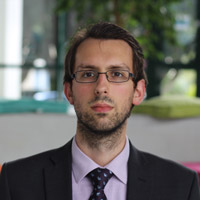Rapid changes in regional and global geopolitics have fueled debates on the structure of the international system. In a globalizing world, the role of states and international organizations has increased manifold. The Shanghai Cooperation Organization (SCO), which first emerged as a regional organization, has expanded in recent years and has begun to shape global politics.
From this point of view, the Ankara Center for Crisis and Political Studies (ANKASAM) presents the views of Assoc. Prof. Dr. Matthieu Grandpierron from ICES-Vendée Catholic University to evaluate the effects of the SCO on regional and global geopolitics.
1. What do you think the impact of the SCO has on regional and global geopolitics?
The SCO is a very different and noteworthy organization from Western organizations such as the North Atlantic Treaty Organization (NATO). NATO was built in the context of the Cold War and first emerged as a political and military alliance aimed at containing the Union of Soviet Socialist Republics (USSR). Later, the organization was reshaped in practice to support the geopolitical interests and political ideas of the United States of America (USA).
The SCO is different from this. This is because member states do not share the same geopolitical interests. For example, China, India, and Russia are members of the Organization, they do not share the same political values or interests.Although they can cooperate on certain issues, they are more distant on other issues. As such, the SCO is valuable in that it brings together countries that do not always share common interests and a common vision of the world but are ready for dialog and cooperation on common projects. Therefore, the organization can serve as a model or at least a source of inspiration for future international and regional organizations.
2. What factors contribute to changes in the international order, and how do these changes affect SCO countries in particular?
The current international order is based on the principle of liberal internationalism and was largely shaped by the United States after the Second World War to promote its geopolitical interests and strategies. Therefore, international law and international organizations can be understood as instruments through which the US projects its power and protects its interests. This is most evident in the case of human rights, which have been instrumentalized by the US and other Western countries to play politics of expediency and legitimize regime change.
This international order promoted by Western countries has been increasingly contested since the 2008 economic crisis.This is because it seems less and less “international” and more and more “Western” and more and more disconnected from the content of the United Nations (UN) Charter. The current policies toward Russia are a clear example of this: Western countries have developed the rhetoric that they are imposing “sanctions” on Russia. In reality, however, these are not sanctions but unilateral coercive measures. The word “sanctions” refers to a decision taken by a court and is intended to create the idea that there is a “good” side and a “bad” side. But in fact, there is only one side: power politics.
In addition, Western countries, especially the United States and France, have often tried to replace their pragmatic diplomacy with ideological and emotional diplomacy. In addition, Western countries, especially the US and France, tend to abandon their pragmatic diplomacy for ideological and emotional diplomacy, which leads to international relations being evaluated only through the lens of their own interpretation of human and minority rights and democracy. This is perceived elsewhere as neocolonialism and leads to the rejection of these countries.
Important actors on the international stage, such as China, Russia, India, Turkey, and Iran, although they have very different geopolitical interests, share some commonalities. This is the view that the international order should be in line with the needs and interests of all countries, not just Western countries. In this context, the SCO is key as it provides a platform for the exchange of political views and ideas to imagine alternatives to the international order that are more compatible with the “Western international order” and mutually beneficial for all concerned countries.
3. Could you share your views on how the SCO is shaping the balance of power in the international order?
The balance of power refers to a neo-realist understanding of international relations built around the idea of power politics and military antagonisms. NATO is an organization built around this understanding. SCO is a political alliance, not a military alliance. Its political philosophy and functioning are aimed at providing member states with a platform for cooperation, not power politics (which, like NATO, is a vector of US interests).
The SCO should be better analyzed through the lens of the British school and its idea of “rebellion against the West”: Western countries are no longer legitimate to lead the international system, and international norms should be applied differently according to the specificity of a region (history, political ideas, culture, etc.). The SCO is a platform that supports member states in reinterpreting international norms according to the actual content of the United Nations Charter and not according to ideologies and emotions.
There is also the idea that the international order should be regionalized: regional issues should not be managed at the international level but by the countries that are part of the region. According to this understanding, problems and tensions cannot be solved by actors who are disconnected from the region’s history and culture.
Assoc. Prof. Dr. Matthieu Grandpierron

Matthieu Grandpierron is Associate Professor of International Relations and Head of the Department of Political Science at the Catholic University ICES-Vendée in France. He studied at Leiden University and completed his PhD at Ecole Polytechnique. He has been an invited researcher at the University of Ottawa and Columbia University. His latest book is “Nostalgic Virility as a Cause of War”. Grandpierron also conducts research on Chinese foreign policy and the SCO.
